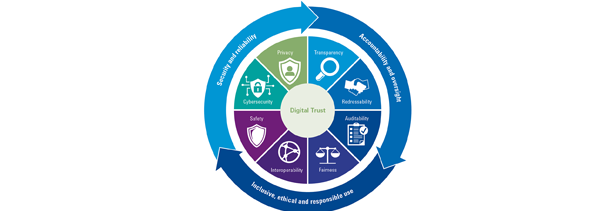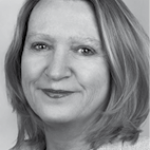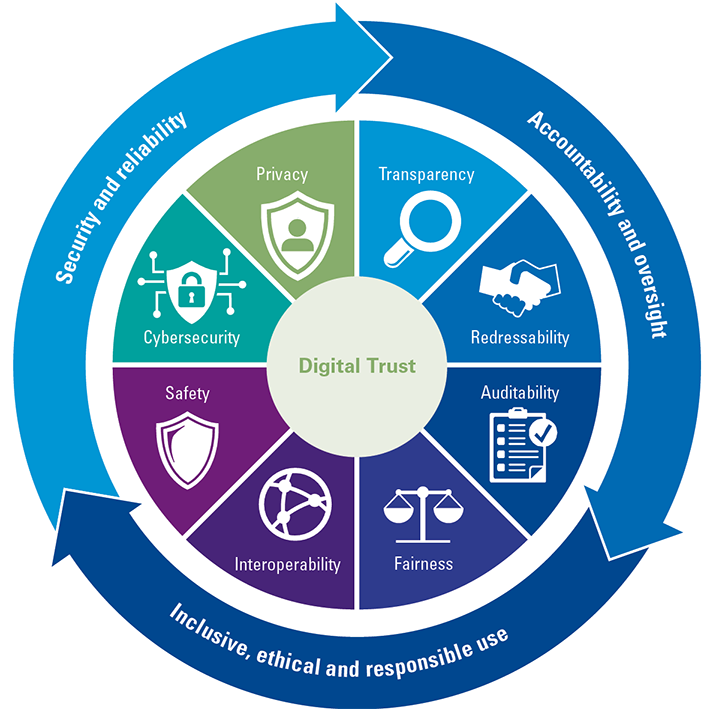Digital trust is an accelerator of economic growth. Digital flows of information between businesses or between businesses and their customers enable more efficient forms of collaboration and more effective ways of meeting supply with demand. The digitization of services and information technology generally forms the backbone of most developed economies today.
Often, the reliability of these technological solutions is taken for granted – we trust them. The fragility of trust in digital technology and services and what happens if digital trust is lost, on the other hand, is often underestimated. The increasing use of technology such as artificial intelligence to support decision-making of businesses and governments is just one example of a highly-debated area of concern in this regard ([Euro23]).
At the same time, across the world a large number of people is still busy getting online. As of early 2023, just under two thirds (64%) of the world population were connected to the Internet ([Petr23a]). This number stretches from almost 100% in developed countries down to less than 20% in the least developed countries ([Petr23b]). With more than one third of the world population still not online, the need for fast-paced technological development often outruns considerations such as cybersecurity, privacy and digital ethics.
While new digital solutions may accelerate growth at first, the unregulated or abusive use of the same technology (including by governments) can lead to a trust crisis later on that robs the technology of its socio-economic potential. The installation of spyware by governments on insecure mobile devices is one example, but insufficient protection of personal data (and subsequent abuse by criminals), as well as unreliable or biased applications that lead to unfavorable outcomes for their users, also form part of the problem.
Together for better
To tackle the risks to digital trust globally, KPMG has teamed up with the World Economic Forum and other actors from the private and public sector to develop a Global Framework for Digital Trust. This includes companies such as Microsoft, Google, Ikea and Dell, government entities including the EU Commission and Cyber Security Agency (CSA) of Singapore, other consultancy firms including Accenture and PwC, as well as civil society groups such as the Red Cross and Consumers International.
The collective efforts have led to a joint report titled Earning Digital Trust: Decision-Making for Trustworthy Technologies ([WEF22]). The report introduces a decision-making framework for leaders to champion digital trust (Figure 1). It provides practical guidance on how to design and deliver trustworthy digital products and services, balancing principles such as security and reliability, accountability and oversight, as well as the inclusive, ethical and responsible use of technology.
Figure 1. A global framework for digital trust ([WEF22]). [Click on the image for a larger image]
Moving ahead
In 2023, the collaboration between KPMG and the World Economic Forum will move into its second phase, promoting the adoption of the Digital Trust Framework globally. To this end, a series of global workshops will be launched in different geographic regions, including a session in the Netherlands on 7 June 2023 at the KPMG and Compact Magazine conference “50 years of Digital Trust”. The workshop will be co-presented by Dr. Augustinus Mohn (Project Fellow Digital Trust at World Economic Forum), Prof. Lam Kwok Yan (Executive Director, National Center for Research in Digital Trust of the Nanyang Technological University, Singapore) and Caroline Louveaux (Chief Privacy Officer of Mastercard).
In addition to KPMG’s collaboration with the World Economic Forum, the Digital Trust Center of Singapore and the Centrum Wiskunde & Informatica (CWI, the national research institute for mathematics and computer science) in the Netherlands have recently joined efforts to look for synergies on digital trust at the intersection of governance and technology. The goal is to come up with a series of use cases to support businesses in adopting and governing trust technologies.
Singapore and the Netherlands are highly digitalized countries, both with governments that actively support the continuous development of their digital economy and smart cities. And both are aware of the importance of international collaboration in progressing technology, but also in setting standards and developing international use cases. With the smart nation initiative at its core, Singapore aims for a digital-first country, focused on digital government, digital economy and digital society. The Netherlands is one of the digital frontrunners in Europe with a strong focus on value-driven digitization. One of the key components of a successful transformation to a digital economy is trust. In the Netherlands this is underlined in the National Digitization Strategy and the Value-Driven Digitalization Work Agenda. Singapore is internationally recognized for its work on trust technologies in the National Digital Trust Center. This center was established in June 2022 to work on the fundamentals of trust in the digital economy.
“Digital systems now govern every aspect of our lives. From all-seeing sensors to the Internet, which connects us to the future’s smart cities and autonomous vehicles. People have a right to expect that they can trust these systems, the services they provide, and their protection of our most personal information. In these uncertain times, digital trust matters more than ever. Organizations that recognize this societal responsibility, can build respected brands and enduring relationships for the mutual benefit of all.”
– Akhilesh Tuteja, Global Cyber Security Practice Leader, KPMG
For more information about the Digital Trust initiative, go to https://initiatives.weforum.org/digital-trust, or contact Augustinus Mohn (mohn.augustinus@kpmg.nl).
References
[Euro23] European Commission (2023). A European approach to artificial intelligence. Retrieved from: https://digital-strategy.ec.europa.eu/en/policies/european-approach-artificial-intelligence
[Petr23a] Petrosyan, A. (2023). Number of internet and social media users worldwide as of January 2023. Statista. Retrieved from: https://www.statista.com/statistics/617136/digital-population-worldwide/
[Petr23b] Petrosyan, A. (2023). Countries with the lowest internet penetration rate as of January 2023. Statista. Retrieved from: https://www.statista.com/statistics/725778/countries-with-the-lowest-internet-penetration-rate/
[WEF22] World Economic Forum (2022). Earning Digital Trust: Decision-Making for Trustworthy Technologies. Retrieved from: https://www.weforum.org/reports/earning-digital-trust-decision-making-for-trustworthy-technologies/





